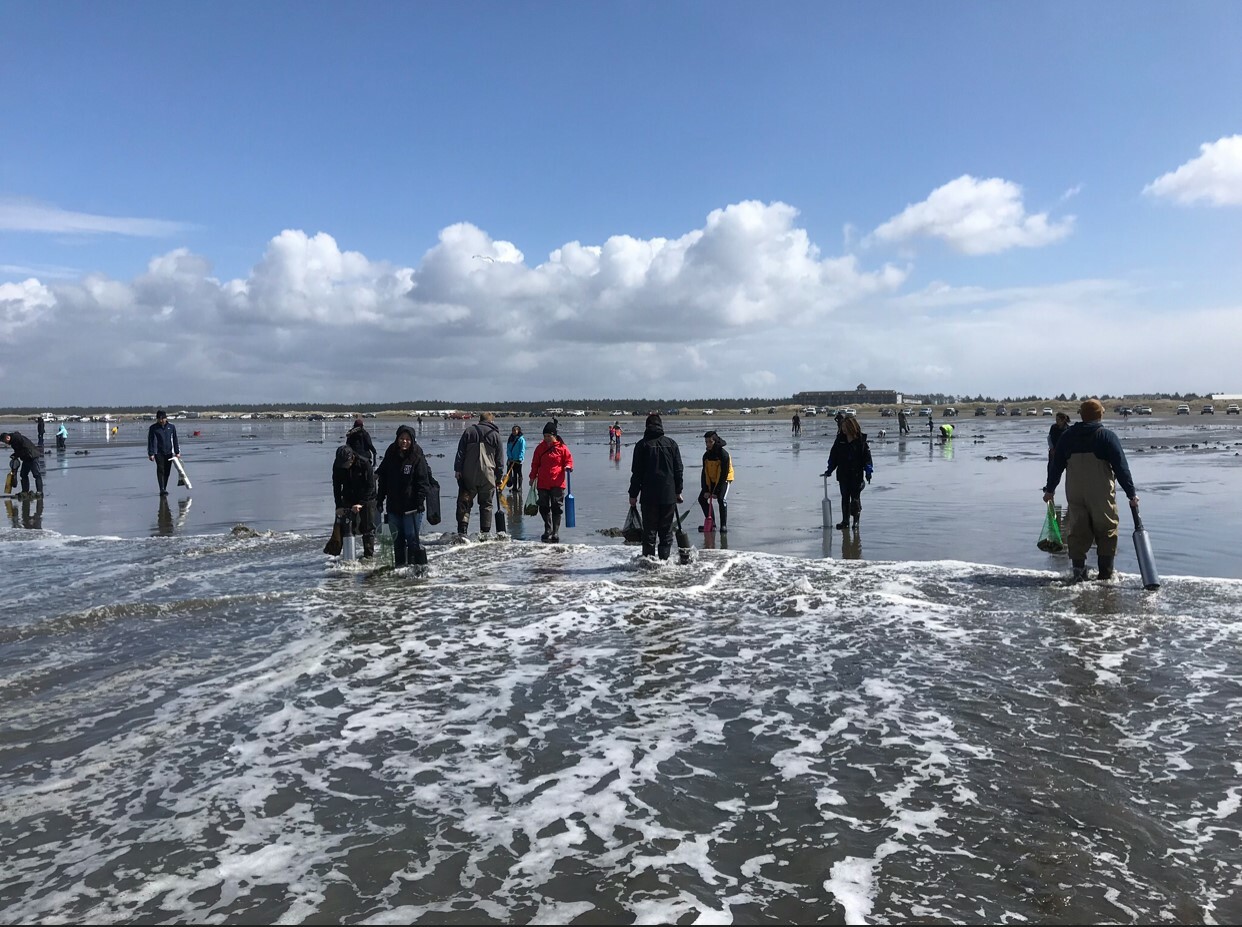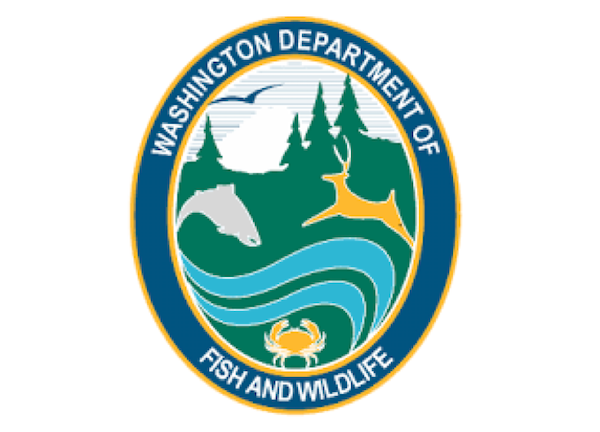Fish Report for 4-8-2022
WDFW approves 6 days of razor clam digs beginning April 16; daily limit increased to 20 clams

by WA Department of Fish & Wildlife Staff
4-8-2022
Website
OLYMPIA – Shellfish managers with the Washington Department of Fish and Wildlife (WDFW) confirmed Friday that the next round of razor clam digging can proceed as planned from April 16-21 with an increased limit of 20 clams.
“It’s been a great season and we are excited that abundant razor clam populations will allow us to increase the daily limit as we near the end of the season,” said Dan Ayres, the WDFW coastal shellfish manager. “Hopefully, a larger limit will help diggers enjoy a trip, even with the high price of fuel. The tentative digs in early May will mark the end of the spring season.”
On all open beaches – Long Beach, Twin Harbors, Mocrocks, and Copalis – the daily limit from April 16 through May 7 is 20 clams instead of the usual 15. Each digger’s clams must be kept in a separate container, and all diggers must keep the first 20 clams they dig, regardless of size or condition.
Digging is allowed during low tide from 12 a.m. through 11:59 a.m. only:
- April 16, Saturday, 7:03 AM; -0.2 feet; Long Beach, Twin Harbors, Copalis (Long Beach Razor Clam Festival)
- April 17, Sunday, 7:45 AM; -0.8 feet; Long Beach, Twin Harbors, Mocrocks (Long Beach Razor Clam Festival)
- April 18, Monday, 8:28 AM; -1.2 feet; Long Beach, Twin Harbors, Copalis
- April 19, Tuesday, 9:14 AM; -1.3 feet; Long Beach, Twin Harbors, Mocrocks
- April 20, Wednesday, 10:04 AM; -1.2 feet; Long Beach, Twin Harbors, Copalis
- April 21, Thursday, 10:59 AM; -0.9 feet; Long Beach, Twin Harbors, Mocrocks
Additional tentative digs pending final approval for marine toxin testing are:
- April 29, Friday, 6:31 AM; -0.1 feet; Long Beach, Twin Harbors, Copalis
- April 30, Saturday, 7:10 AM; -0.5 feet; Long Beach, Twin Harbors, Mocrocks
- May 1, Sunday, 7:47 AM; -0.8 feet; Long Beach, Twin Harbors, Copalis
- May 2, Monday, 8:22 AM; -0.8 feet; Long Beach, Twin Harbors, Mocrocks
- May 3, Tuesday, 8:57 AM; -0.7 feet; Long Beach, Twin Harbors, Copalis
- May 4, Wednesday, 9:34 AM; -0.4 feet; Long Beach, Twin Harbors, Mocrocks
- May 5, Thursday, 10:13 AM; -0.1 feet; Long Beach, Twin Harbors, Copalis
- May 6, Friday, 10:57 AM; +0.2 feet; Long Beach, Twin Harbors, Mocrocks
- May 7, Saturday, 11:48 AM; +0.5 feet; Long Beach, Twin Harbors, Copalis (digging hours extended to 1PM)
Details on the razor clam season can be found at wdfw.wa.gov/razorclams.
Not all beaches are open for every dig, so diggers are encouraged to make sure their intended destination is open before heading out. The most successful digging occurs between one and two hours before the listed time of low tide.
The size of razor clams seen in surveys have been unusually large. At Long Beach the average is 4.3”; Twin Harbors, 4.7”; Copalis, 4.8"; and Mocrocks, 4.5".
Shellfish and seafood enthusiasts can make plans to attend the Long Beach Razor Clam Festival on April 16-17. The Long Beach Merchants Association hosts the event that includes free clam digging lessons and cleaning demos, a chowder taste-off competition, live music, prize contests, free fritter samples, vendors, food trucks and more. For details on the festival, go to https://www.longbeachrazorclamfestival.com/.
Razor clam diggers must purchase their new 2022-2023 recreational fishing or shellfishing licenses to participate. All diggers age 15 or older must have an applicable fishing license to harvest razor clams on any beach. Details can be found at https://wdfw.wa.gov/licenses.
As in past years, WDFW is asking beachgoers to avoid disturbing nesting snowy plovers – a small bird with gray wings and a white breast – by staying out of the dunes and posted areas along the southwest Washington coast. Snowy plover nests are nearly invisible, and it is vital to give these birds the space they need to live and thrive during their nesting period, especially along the southern end on Twin Harbors – known as Midway Beach – and the north end of Long Beach. People should avoid leaving leftover food or trash – which attracts predators – on the beach and picnic areas, keep pets on a leash, stay out of dunes, and avoid areas which are clearly marked with posted signs. When driving on the beach, please respect the 25 MPH speed limit and enter only at designated access points. Be sure to stay on the hard-packed sand near the high tide line to avoid crushing clam beds and snowy plover nests.
For helpful tips on how to clean and cook razor clams, go to the WDFW YouTube link at https://www.youtube.com/watch?v=sTaRaHkFFEw. For additional tips and razor clam recipes, go to https://wdfw.wa.gov/fishing/basics/digging-razor-clams. To learn more about razor clam abundance, population densities at various beaches, and how seasons are set, visit https://wdfw.wa.gov/fishing/shellfishing-regulations/razor-clams#management.
The Washington Department of Fish and Wildlife works to preserve, protect, and perpetuate fish, wildlife and ecosystems while providing sustainable fish and wildlife recreational and commercial opportunities.
More Reports

4-7-2022
OLYMPIA – Washington Department of Fish and Wildlife (WDFW) fishery managers today announced a salmon fishing closure in Marine Area...... Read More
WA Department of Fish & Wildlife Reports
for Wednesday, April 6th, 2022: Get ready for the April 23 lowland lakes trout opener

Website Hosting and Design provided by TECK.net